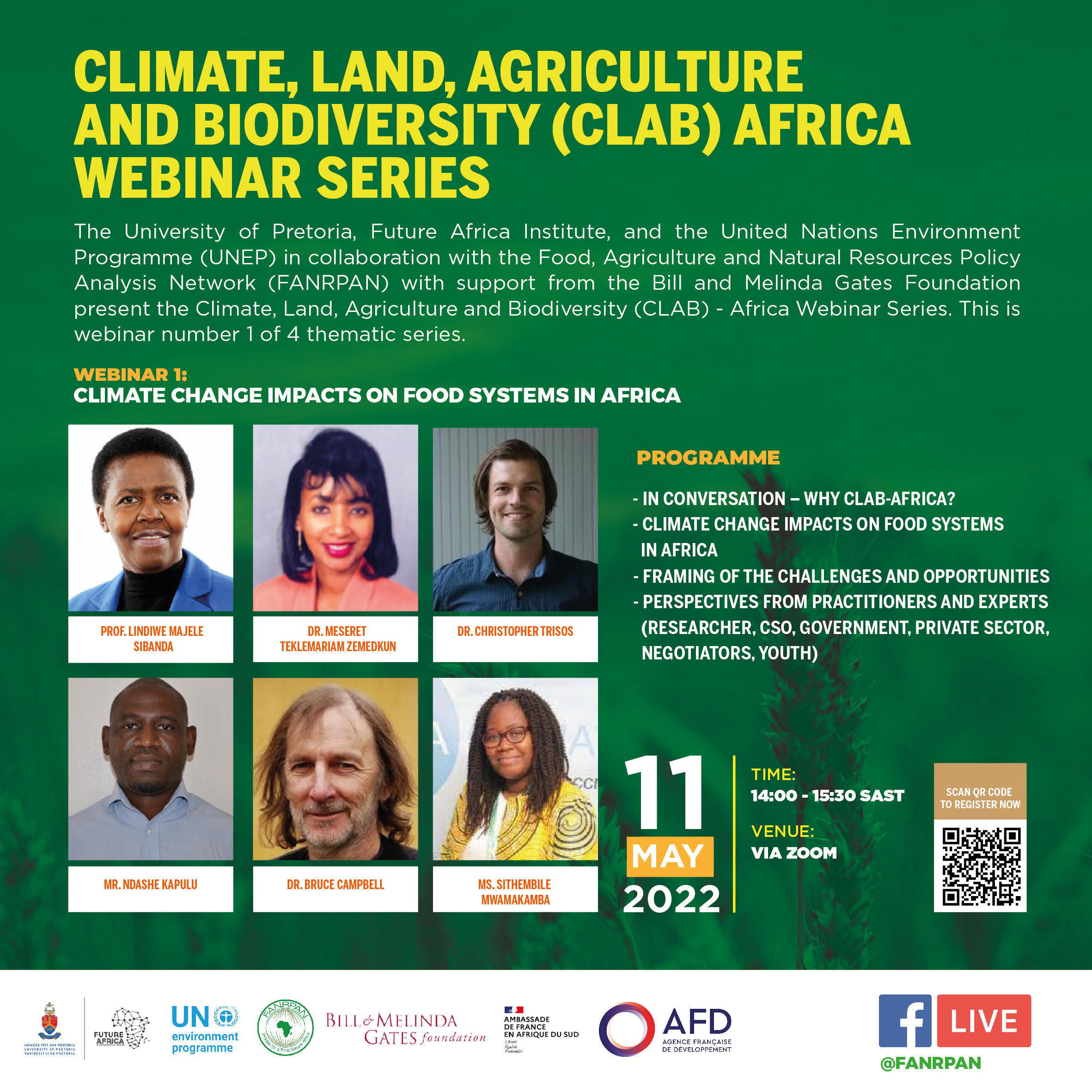Africa has the most severe vulnerable hot spots to climate change hence increasing the food and water deficit. Addressing these challenges requires new technologies that deal with multiple and interacting stresses.
Whether viewed from a human health, environmental, climate or a financial perspective, food systems and agricultural production in Africa need urgent intervention. The Climate Impacts on Food Systems in Africa Webinar will focus on recommendations on:
(a) applying climate change science to improve food systems.
(b) renewable energy as a solution for climate-sensitive food solution.
(c) Africa’s plant diversity for increased yields and improved nutrition.
(a) applying climate change science to improve food systems.
(b) renewable energy as a solution for climate-sensitive food solution.
(c) Africa’s plant diversity for increased yields and improved nutrition.
- Moderator: Prof. Lindiwe Majele Sibanda, Future African University of Pretoria.
- Dr Meseret Teklemariam Zemedkun, United Nations Environment Programme (UNEP).
- Dr. Christopher Trisos, African Climate & Development Initiative, Coordinating Lead Author, Chapter 9, IPCC AR6 WGII Report; Core Writing Team, IPCC AR6 Synthesis Report.Climate Change Impacts on Food Systems in Africa Presentation
- Mr. Ndashe Kapulu, Zambia Agriculture Research Institute (ZARI) Framing of the challenges and opportunities
- Dr. Bruce Campbell, CLIM-EAT Perspectives from Practitioners and Experts (Researcher, CSO, Government, Private Sector, Negotiators, Youth)
- Moderator Ms. Sithembile Mwamakamba, FANRPAN
- Dr. Tilahun Amede, Alliance for a Green Revolution in Africa (AGRA)
- Ms. Joyce Kobia, Youth Representative, West Africa Center for Crop Improvement
Resource that was reviewed during the webinar:
This policy brief focuses on the impacts of climate change on food systems, which is a theme under the CLAB-Africa Project. The objectives of the theme include pursuing recommendations on: (i) applying climate change science to improve food systems; (ii) renewable energy as a climate-sensitive food solution; and (iii) Africa’s plant diversity for increased yields and improved nutrition.
The key messages from the study are as follows:
- Enhance robust financial investment strategies that include participation of the private sector, towards accelerating the adoption of Climate Smart Agriculture (CSA).
- Document and utilise indigenous knowledge systems (IKS) to transform food systems and enhance sustainable development in the context of climate change.
- Conceptualise projects of sufficient scale and longevity (minimum ten years), through forming consortiums for donors who are willing to pool resources for long-term investments, in order to ensure the sustainability and effectiveness of projects.
- Position farmers, particularly women and youth at the centre of designing context specific adaptation strategies in order to transform food systems for specific African contexts.
- Build and strengthen partnerships for climate-resilience and adaptation by leveraging best practices and tailoring them to local conditions.
The nature of the Project's contributions will be in the form of science-based actionable policy recommendations within the four identified clusters. These clusters are namely:
- climate impact on food systems;
- land restoration and biodiversity;
- <people—animal—ecosystems> health and wellbeing; and
- land-water-energy resources uses.
Related:
24 March 2022. Malabo Climate Policy Webinar Series: At the intersection of climate change and food systems: what are Africa’s key priorities and opportunities?This webinar was the first of a series of four exploring the rapidly converging agendas of food systems
transformation with climate action. It explored the latest science and present key priorities for the
African continent.
- Introduction & welcoming remarks Ms. Nachilala Nkombo, Country Director, WWF Zambia; member Malabo Montpellier Panel
- The science - Dr. Edmond Totin, Lead Author, IPCC AR6 chapter on Africa
In August 2021, the IPCC working group published its latest assessment report providing the most up-to-date physical understanding of the climate system and climate change. On February 28, 2022, this was followed by the second report of this assessment, presenting the impacts of climate change. How is the climate changing across African countries and what are the impacts of these changes on African societies and environments? Specifically, what do these changes mean for food security and nutrition? - Climate policy – Mr. Ephraim Shitima, Chair of the African Group of Negotiators Africa at UNFCCC – what have our priorities been? Overview of African Climate Change and Resilient Development Strategy and Action Plan 2022-2032.
- Converging systems – Dr. Martin Frick, Director, WFP Global Office Berlin An overview of how food systems and the climate domain have evolved towards each other
10 March 2022. Adapting agriculture in Africa to build resilience to climate change
- Chair: Prof. Anthony Nyong, GCA Senior Regional Director, Africa
- Framing Speaker: Ademola Braimoh, Coordinator, Climate Smart Agriculture, World Bank (author of chapter on Agriculture and Food Security in State and Trends in Adaptation Report 2021: Africa)
- Dr. Tilahun Amede Head, Resilience, Climate & Soil Fertility, AGRA
- Dr. Suzanne Carter, Lead Partnerships, Adaptation Research Alliance, Cape Town, South Africa
- Mr. Mahama Suleman Elisha, Global Farms and Trading Company Limited
- Dr. Sonja Vermeulen, Consultative Group for International Agricultural Research, CGIAR
- Dr. Caroline Mwongera, Alliance of Bioversity International and CIAT



No comments:
Post a Comment